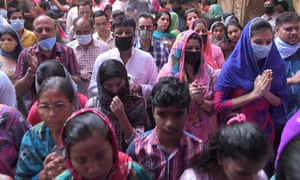
Millions of Europeans faced tough new coronavirus restrictions on Saturday as governments stepped up efforts to slow the surge in infections, after the World Health Organization reported a “very concerning” 44% rise in European cases over one week.
From Saturday evening, Paris and several other French cities go under a nighttime curfew that will last at least a month. England is banning mixed household gatherings in the capital and other areas, and Italy’s most populous region is limiting bar openings and suspending sports events.
The need for action in France was underlined as the country recorded another record for new cases, with over 32,000 registered in 24 hours.

In a bid to stem the worrying rise in infections and in the hope of heading off a return to full lockdowns, many governments have tightened measures to control the spread of the pandemic – even if some dissenters are fighting back in the courts.
As a region, Europe is reporting more daily cases than India, Brazil and the US combined.
Of every 100 infections reported around the world, 34 were from European countries.
The region is currently reporting a million new infections about every nine days and has reported more than 6.3 million cases since the pandemic began.
Major European countries – the UK, France, Russia, the Netherlands and Spain – accounted for about half of Europe’s new cases in the week to 18 October.
Several European countries are closing schools, cancelling elective surgeries and enlisting student medics as the authorities face a Covid-19 resurgence.
Russia is moving students to online learning and Northern Ireland is closing schools for two weeks and restaurants for four.
In Spain, authorities in Catalonia ordered bars and restaurants to close for 15 days and limited the numbers of people allowed in shops.
The Czech Republic has also shifted schools to distance learning and plans to call up thousands of medical students. Hospitals are cutting non-urgent medical procedures to free up beds.
Polish health officials have warned the country is on the brink of a disaster as a record 6,526 new coronavirus infections and 116 deaths were reported this week.
Poland is ramping up training for nurses and considering creating military field hospitals.
Around the world: Latin America is the worst-affected region with about 27% of total Covid-19 cases followed by Asia, North America and Europe.
India is reporting fewer cases this month compared with September, with 69,000 cases per day.

The numbers have fallen by more than 20,400 over the last three weeks, down 22% from its previous peak. India reported 55,342 cases on 13 October, its lowest daily increase since 18 August.
In the US, which has the largest total number of cases and deaths in the world, new infections are edging higher along with the most hospitalised Covid-19 patients since early September.
The US has suffered more than 218,000 fatalities, on Friday revealed a record deficit of $3.1tn in the fiscal year ended September 30.
It also announced that the number of cases there had passed eight million, while global daily infections also hit a new record.


